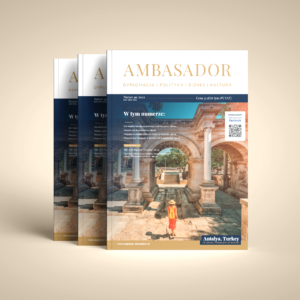On that day, the eyes of the whole world were on Poland. On 27 January, the 80th anniversary of the liberation of the German death camp at Auschwitz-Birkenau was commemorated at the Auschwitz Memorial. Representatives from nearly 60 countries attended the ceremony, including King Charles III, French President Emmanuel Macron, the President of Germany, the Prime Minister of Canada, and Ukrainian President Volodymyr Zelensky. The commemorations were held under the patronage of the President of the Republic of Poland, Andrzej Duda, who before noon that day, accompanied by survivors, paid tribute to the victims at the Execution Wall in the courtyard of Block 11 of the Auschwitz I camp. It was here that the Germans murdered thousands of people during the operation of the death camp.
– We Poles, on whose occupied land (…) the Germans built this extermination industry and concentration camp, are the guardians of memory. In a way, we can say that we are continuing this extraordinary mission, which was voluntarily undertaken during the Second World War by cavalry captain Witold Pilecki, who deliberately gave himself up to be imprisoned in this camp in order to bear witness, in order to be able to create a resistance movement and also to escape from here as living proof of what was happening at the camp, and to be able to take this testimony to the Western Allies in order to bear witness to what Nazi Germany was doing in the countries it occupied. Today, as the painful heirs of Witold Pilecki, we are taking care of these places, Poland is taking care of these places, so that the memory does not fade, so that it is always remembered and through this memory the world will never again allow such a dramatic human catastrophe, or more precisely, a catastrophe of humanity – said President Duda.
The main ceremony, which began in the afternoon, was opened by a speech by one of the survivors, Marian Turski, followed by others – Janina Iwańska and Leon Weintraub.
Piotr Cywiński, director of the Auschwitz Museum, spoke last:
– History does not create trauma, but memory can. Memory is the key to today’s world and to shaping the future. Memory ‘hurts, helps, guides, warns, makes us aware and obliges us, pointing out that without memory we have no history and no points of reference. Who are you without memory? You have no history, no experience, no points of reference.
After the speech by the director of the Auschwitz Museum, the shofar sounded and the rabbis recited the Kaddish. The ceremony ended with former prisoners placing candles on the wagon that became the symbol of the commemoration of the 80th anniversary of the liberation of Auschwitz. The representatives of the state delegations attending the commemoration then laid candles.
The Germans constructed Auschwitz in 1940 to imprison Poles. Two years later, they established Auschwitz II-Birkenau, where they built the infrastructure for the mass murder of Jews – mainly gas chambers and crematoria. The camp complex also had a network of dozens of subcamps where prisoners were used for slave labour.
From the memoirs of Marian Turski, journalist and former Auschwitz prisoner:
– One of the happiest days of my life was when they took us to Auschwitz. Everything felt right. And the transport, and the camp. The driveway to the ramp. It was grey. Fire from the chimneys and – optimistically – living people. It was confirmed that this was not just a death camp. Then the expulsion from the wagons. Dogs, SS men. Prisoners from so-called Canada (prisoners sorting the belongings). An atmosphere of total terror. No time to think. Only fear. I belong to a minority. Women, old people, children are directed to the right. In the minority are the stronger, healthier, younger men. I understand that I am on the good side. (…) Suddenly I see the sign ‘zur Sauna’ – I am reminded of the BBC reader who said: This is not a bathhouse, it’s a gas chamber, don’t be fooled! (…). They ordered us to undress, to the barbers. They were Dutch Jews. They shaved us with very, very blunt razor blades. We all had messed up heads and bodies. And then they poured Lysol on us. Everyone was crying with pain. I was the only one who was happy. I realised that my life had just been made longer. (…)
The camp day began at 4.30 a.m. with a beating on a piece of railing suspended from a pole. The prisoners knew that every day could be their last. Everything was done at a deadly pace; you could lose your life for being late. The thousands of people in the camp had only a few moments to wash in cold water or use the latrine.
From the memoirs of Józef Pełczyński, whose fate is described in the book Goodnight Auschwitz by Maciej Zdziarski and Aleksandra Wójcik:
– Every morning there was a long queue for breakfast. It consisted of half a litre of tea or coffee – in the camp these names meant water with coffee or some herbs in water. The next gong was for roll call. This is where the order was given to form the work teams, and the race to get the lightest possible work began Those who could work could live. The most desirable jobs were in the kitchen, in the workshop, and under the roof. Jobs such as carrying railway sleepers or cleaning ponds, which meant standing in water for hours, were avoided like the plague. These jobs led prisoners straight to death.
Hunger filled the thoughts of the camp’s inmates. The hard work from 6 a.m. to 5 p.m. and the restricted diet were calculated to quickly deplete the prisoners. The camp soup consisted of turnip, potato pieces and sometimes with a little porridge. In the evening, the bread ration was 250-350 grams – it was mouldy and contained sawdust.
From the memoirs of Marian Turski:
– Coffee in the morning, coffee in the evening, and some coffee for lunch,’ was one of the camp rhymes. In addition, the kitchen was left in the hands of the German criminal prisoners, which meant that the food went to the others in smaller portions.
Death became part of daily life. Starvation, epidemics, selections for the crematorium or executions in Block 11, phenol injections, the experiments of the dreadful Dr Mengele, all killed. When there was a day off, the prisoners had time to clean up. They fought the vermin, although no means were successful. They waited for Sunday.
From the memoirs of Jozef Pełczyński:
– Although the Nazis made prisoners work even on Sundays, they allowed for sending letters once a fortnight at a certain time. The prisoner had to pay for a blank sheet and a stamp with food, and was not allowed to write anything other than the formula: I am well, I feel well – but even such words were priceless to the family. The camp day ended with the evening roll call. You knew: now it’s roll call and anything can happen, but when it’s over – for today the killing is over. Then we would collapse on our bunks in the barracks and fall into a sleep that was more like night-time hallucinations in sickness.



Sledź nas na: